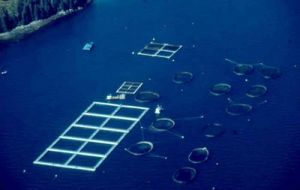MercoPress. South Atlantic News Agency
FAO: Aquaculture in 2012 will supply more than 50% of world’s fish consumption
 Most is concentrated in Asia but Norway and Chile lead in salmon farming
Most is concentrated in Asia but Norway and Chile lead in salmon farming Aquaculture is the world's fastest-growing source of animal protein and currently provides nearly half of all fish consumed globally, according to a report published here by FAO.
The report World Aquaculture 2010 found that global production of fish from aquaculture grew more than 60% between 2000 and 2008, from 32.4 million tons to 52.5 million tons. It also forecasts that by 2012 more than 50% of the world's food fish consumption will come from aquaculture.
“With stagnating global capture fishery production and an increasing population, aquaculture is perceived as having the greatest potential to produce more fish in the future to meet the growing demand for safe and quality aquatic food,” the report said.
FAO states that with growth in volume and value, aquaculture has clearly helped reduce poverty and improve food security in many parts of the world.
But aquaculture has not grown evenly around the planet. Marked differences in production levels, species composition and farming systems exist within and between regions, and from one country to another.
The Asia-Pacific region dominates the sector -- in 2008 it accounted for 89.1% of global production, with China alone contributing 62.3%. Of the 15 leading aquaculture-producing countries, 11 are in the Asia-Pacific region.
A few countries lead the production of some major species, such as China with carps; China, Thailand, Viet Nam, Indonesia and India with shrimps and prawns; and Norway and Chile with salmon.
In terms of farming systems, intensive systems are more prevalent in North America and in advanced aquaculture-producing countries in Europe and Latin America. In the Asia-Pacific region, despite major technical developments, small-scale commercial producers remain the backbone of the sector.
Small-scale producers and small and medium entrepreneurs are also important players in Africa. Commercial and industrial-scale producers dominate in Latin America, but there is strong potential for the development of small-scale production.
While the demand for aquaculture products continues to increase, there is growing recognition of the need to address consumers' concerns for quality and safe products and animal health and welfare, the report said. Thus, issues such as food safety, traceability, certification and eco-labelling are assuming growing importance and considered as high priorities by many governments.
Aside from environmental sustainability, other major challenges faced by aquaculture include climate change and the global economic downturn, the report noted. The sector should therefore prepare itself to face their potential impacts and make special efforts to further assist small-scale producers by organizing them into associations and through promotion of better management practices.
“Achieving the global aquaculture sector's long-term goal of economic, social and environmental sustainability depends primarily on continued commitments by governments to provide and support a good governance framework for the sector,” the report added.




Top Comments
Disclaimer & comment rules-

Read all commentsAnd as the marine province trends to economic exploitative extinction, this percentage will trend from 50% to nearly 100%.
Nov 16th, 2011 - 08:11 pm 0We never learned to overcome the Tragedy of the Commons,
but we surely know how to FARM aquatic fish stocks. Not all marine - some of the most productive spp that will sustain humanity will be the carps, the FW cats, and the tilapias.
Top-end spp like salmonids and prawns will keep my palate satisfied, even though I know their fish meal pellets, etc, continue to diminish natural biomass levels in the non-farmed environment.
I almost killed to conserve natural stocks when I was younger;
now I just like a grilled (farmed) trout.
Commenting for this story is now closed.
If you have a Facebook account, become a fan and comment on our Facebook Page!